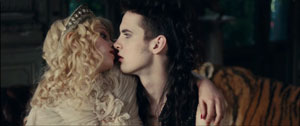Film: Jessica Kellgren-Hayes
Clash of divas
In 1970s Paris, the art world was taken by storm as bonkers bohemian photographer Irina Ionesco’s provocative nude photographs of her own child made waves. That misused muse, Eva Ionesco, has now turned her childhood experiences into a film, ‘My Little Princess’, and as is to be expected the tale is a car crash one cannot help but watch.
Cute young Violetta (Anamaria Vartolomei) is living contentedly with her starkly religious great-grandmother (Georgetta Leahu) when her eccentric mother Hannah (Isabelle Huppert) resurfaces after one of many prolonged absences. Innocent Violetta finds her mother’s outre glamour captivating, so readily submits to a request to pose for Hannah’s photographs of haunted period damsels. The pictures, with agonising predictability, quickly transition into more overtly sexual territory as Hannah believes inhibitions to be bourgeois.

Hannah becomes the empress of morbid eroticism whilst Violetta becomes the class pariah as the clothes she is sent to school in become ever smaller. Despite the film being dominated by an archly artificial performance from Huppert, as the spotlight-seeking terrible mother, this affected drama has much going for it and lays the groundwork for an intriguing psychological drama.
This unfortunately true tale sadly is not given authenticity by its handling within the cinematic universe. For one instance, whilst Ionesco’s mother started shooting her from age four, the child in the film is 10. Although this saves the audience from watching a girl who has just finished toddling be grotesquely sexualised it in many ways exculpates the mother’s behaviour. Whilst Violetta feels that something might be wrong, her real-life counterpart could not comprehend what was being taken from her, and that is the bigger indignity.
Depiction of the photographs is also relatively restrained, with nudity limited to older models as the bravery that characterises French cinema is lost. We should be watching a bold piece that questions the boundaries between art and pornography but Ionesco’s command of tone leaves a lurid clash of divas- the overbearing and the petulant. Perhaps Ionesco is attempting to hand her childhood proxy more power than she actually had.
Watching a child of any age or gender be exploited by such an egomaniacal parent creates an automatic sympathy in the audience, but Ionesco appears unsure how to then handle it- creating a director peculiarly detached. The psychological impact of Violetta’s lost innocence is neglected in favour of focusing on tantrums and affectations.
Unlike other semi-autobiographical tales of awful parents, the director seems to be underplaying, rather than exaggerating, her appalling upbringing. With great pains taken, Hannah, and by extension Irena Ionesco’s, decisions and behaviour are never condemned.
‘My Little Princess’ stands as a word of warning to all directors, whether their tale is autobiographical or not, to beware of becoming so entangled with the story that they are unable to detach their own viewpoint from that of the audience’s.
If you too make films then FilmFest on TV is the programme for you. For two hours every Sunday night the show broadcasts independent British films to over four million people. Get your creative voice heard with Latest TV!



















